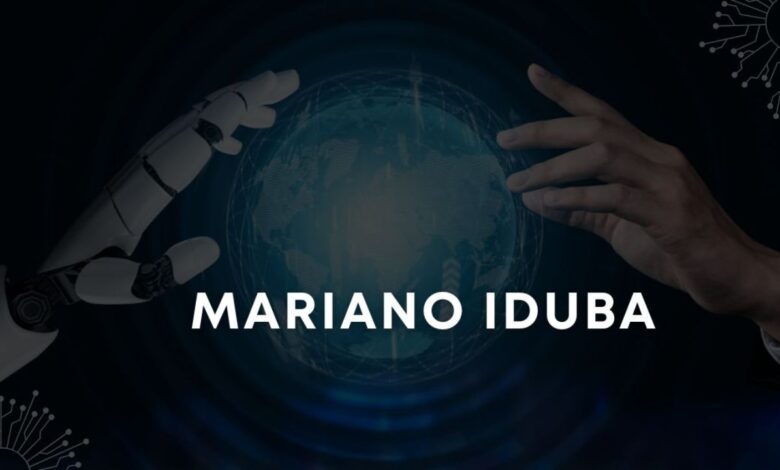In a world where technology often seems to outpace our ability to harness its potential for good, one visionary stands at the intersection of innovation and social change: Mariano Iduba. With an unwavering commitment to leveraging cutting-edge advancements for the betterment of society, Iduba is not just dreaming about a brighter future—he’s building it. Join us as we delve into his inspiring journey, exploring how this tech trailblazer is transforming lives and communities through groundbreaking initiatives that bridge the gap between technology and meaningful social impact. Get ready to be inspired by stories of creativity, resilience, and a relentless pursuit of progress!
Introduction to Mariano Iduba and his background
Mariano Iduba stands out as a transformative figure in the intersection of technology and social impact. With roots deeply embedded in innovation, he has dedicated his life to harnessing the power of tech for good. His journey is not just about personal success; it’s about uplifting communities and creating sustainable change, particularly in developing countries. As education remains a cornerstone for progress, Mariano’s vision offers hope and practical solutions to some of society’s most pressing challenges.
Through solar-powered learning hubs and other groundbreaking initiatives, Mariano is proving that technology can be more than just tools—it can be a lifeline. Join us as we delve into how his work is shaping the future and bridging divides that have long existed between privilege and opportunity.
The impact of technology on education in developing countries
Technology has transformed many aspects of life, especially education in developing countries. Access to the internet and digital tools can open doors previously thought closed.
With online learning platforms, students can connect with educators across the globe. This connectivity fosters a diverse exchange of ideas and knowledge that enhances traditional methods.
Mobile devices have further revolutionised classrooms. They provide access to resources like e-books, tutorials, and interactive lessons at little or no cost.
Moreover, technology helps bridge language barriers through translation apps, making educational content accessible to non-native speakers.
Teachers equipped with tech training are better able to engage their students. Innovative teaching methods spark curiosity and promote critical thinking skills essential for future success.
As these changes unfold, communities begin experiencing newfound opportunities for growth and development driven by educated youth prepared for tomorrow’s challenges.
Mariano iduba solar-powered learning hubs and their success stories
Mariano Iduba’s solar-powered learning hubs are transforming education in remote communities. These innovative spaces harness the sun’s energy, providing a sustainable solution for schools lacking electricity.
Each hub is equipped with computers and internet access, opening up worlds of information to students. In areas where resources are scarce, these centres become lifelines for knowledge. Success stories abound, showcasing students who have excelled academically thanks to this initiative.
One remarkable tale involves a young girl from a rural village who developed coding skills through the hub’s programs. She has since inspired her peers to explore technology further.
Communities report increased enrollment rates as families recognise the value of accessible education. Mariano’s vision doesn’t just bring light; it ignites hope and ambition among youth eager for change.
You Might Also Like: Glenroy
How technology can bridge the digital divide and empower communities
Technology has the potential to transform lives, especially in underserved communities. With access to digital tools, individuals can tap into vast reservoirs of knowledge and resources. This connectivity opens doors that were previously closed.
Online education platforms enable learners from remote areas to engage with quality content. They can learn at their own pace and explore subjects that pique their interest.
Mobile devices further enhance this access by providing real-time information and communication channels. Communities can share ideas, collaborate on projects, and solve local issues together.
Moreover, technology fosters entrepreneurship. Individuals can create online businesses or offer services without needing significant startup capital. This not only boosts economic growth but also instils a sense of empowerment.
As more people gain digital literacy skills, they become active participants in their communities rather than passive observers. Empowered citizens are better equipped to advocate for change and uplift those around them.
Other tech-driven initiatives by Mariano Iduba and their impact on society
Mariano Iduba is not just focused on education; his vision extends to various tech-driven initiatives that address pressing societal issues. One notable project harnesses mobile technology to improve healthcare access in remote areas. By creating apps that connect patients with doctors, he bridges the gap between urban medical resources and rural populations.
Another initiative leverages renewable energy solutions for small businesses. By providing solar power systems, Mariano empowers entrepreneurs to thrive without relying on unreliable electricity sources. This innovation boosts local economies while promoting sustainability.
Additionally, Mariano Iduba champions digital literacy programs tailored for women and marginalised groups. Through workshops and online courses, participants gain essential skills that enhance job prospects and foster independence.
These efforts exemplify how technology can uplift communities, fostering an environment where everyone has the opportunity to succeed regardless of their background or location.
The importance of social entrepreneurship in driving positive change
Social entrepreneurship plays a crucial role in fostering positive change within communities. By combining business principles with social missions, these innovators address pressing challenges like poverty and education inequality.
They create sustainable models that empower individuals rather than offering temporary relief. This approach leads to long-lasting impact, encouraging self-sufficiency among beneficiaries.
Moreover, social entrepreneurs often inspire others to engage in community-building efforts. Their stories resonate and mobilise action from diverse sectors.
Through collaboration and innovative thinking, they attract resources that traditional charities might struggle to secure.
As technology continues to reshape our world, the blend of entrepreneurial spirit and altruism becomes even more vital in ensuring equitable access for all. Social entrepreneurship is not just about profit; it’s a movement towards inclusivity and empowerment for future generations.
Challenges faced by Mariano Iduba and his team in implementing these initiatives
Mariano Iduba and his team encounter numerous challenges in their mission to merge technology with social impact. One significant hurdle is securing funding for their projects. Many potential investors are hesitant to back initiatives that focus on underserved communities.
Logistical issues also arise, particularly when setting up solar-powered learning hubs in remote areas. Infrastructure limitations can hinder access to necessary resources and materials.
Additionally, gaining community trust is essential yet sometimes difficult. People may be sceptical about new technologies or unsure how they will benefit from these innovations.
Training local educators poses another challenge. Ensuring they feel confident using new tools requires time and dedicated support.
Lastly, adapting solutions to fit diverse cultural contexts remains a continuous struggle for Mariano’s organisation. It’s crucial that the tech implemented resonates with the local population while being effective in its purpose.
Plans and projects for Mariano Iduba and his organisation
Mariano Iduba is not one to rest on his laurels. His vision extends beyond current projects, aiming for a broader impact.
One of the key future initiatives involves expanding solar-powered learning hubs into more remote areas. These hubs will serve as critical access points for education and technology, ensuring no child is left behind.
Additionally, Mariano Iduba plans to develop partnerships with local governments and NGOs. Collaborating with these entities can amplify resources and reach underserved communities more effectively.
Innovative programs focusing on digital literacy are also in the pipeline. By empowering individuals with essential tech skills, Mariano’s organisation hopes to create job opportunities that uplift entire communities.
With ambitious goals ahead, it’s clear that Mariano Iduba remains committed to intertwining technology with social change while fostering sustainable development worldwide.
Conclusion
Mariano Iduba’s journey is a testament to the transformative power of technology when aligned with social impact. His innovative approach has not only addressed educational disparities but has also inspired communities to embrace change. The solar-powered learning hubs serve as beacons of hope, illustrating how access to education can uplift entire generations.
By bridging the digital divide, Mariano Iduba demonstrates that technology can be an equaliser in society. His initiatives empower individuals and foster collaboration within communities, creating pathways for sustainable growth.
The challenges he faces are significant, yet they do not deter his vision or drive. Instead, they fuel his commitment to finding solutions that resonate on a larger scale.
As Mariano Iduba continues to pave new paths through tech-driven projects, his legacy grows stronger. He embodies the spirit of social entrepreneurship—showing us all that harnessing technology for good can lead to meaningful change in our world.

